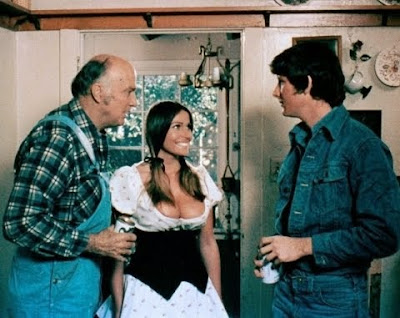Little Big Man
Spoilers
Jack Crabbe, 121 years of age, sits and with great pain recounts his sad history to a reporter. A life that was largely shaped by Native Americans. From his adoption by the Pawnee after they slaughter his parents to his accompaniment of Chief Old Lodge Skins as he attempts to pass away atop an Indian burial ground. In between, what you might call an epic unfolds.
By 1970, the "epic" was hardly a new sort of event at the local cinema, but LITTLE BIG MAN had an attitude that set it apart, announced a harbinger of the Hollywood to come, for a little while at least. It was released in an era when the mainstream was starting to resemble the underground. Movies that threw down the shackles of Hayes' code censorship, that began to more explicitly examine the underbelly of American life. And what better canvas on which to undertake such an examination than during the era where Native Americans clashed with those pioneers who would seek to overtake them? You might say the natives were wrestling with an immigration problem run seriously amok.
Previously, American Indians were portrayed on screen as gross caricatures, as convenient bad guys against clean cut Caucasians. Gradually, more thoughtful films emerged. LITTLE BIG MAN, based on Thomas Berger's wry 1964 novel, portrays the U.S. Cavalry as the villains and America's original residents far more sympathetically than seen before.
Between them is Jack (Dustin Hoffman), latter dubbed "Little Big Man" for his bravery despite being short in stature. His travails lead him from the Cheyenne camp to that of the white man and back, a few times. He meets and becomes associates with a snake oil salesman, a sexually frustrated, Scripture-quoting reverend's wife (Faye Dunaway) who spouts verses about temptation, Wild Bill Hickok (Jeff Corey), and even General Custer (Richard Mulligan). LBM gets married a few times, but loses his wives to the race that raised him.
Director Arthur Penn and co-screenwriters Berger and Calder Willingham's treatment of LITTLE BIG MAN is both deadly serious and (at times) bitterly satirical. There is mastery in so many scenes, often playing on multiple levels. A good example: Little Big Man is passed from sister to sister one lusty night in order to impregnate them. Is there irony in the white man perpetuating the race? The dialogue and rhythm of that scene is a choice glimpse into Berger's method.
Custer is portrayed as a maniac, a bit daft, yet dangerously cunning and aware. He agrees to hire LBM as a scout years after they first meet, noting that everything the young man ever uttered was a falsehood, deeming him a "reverse barometer." The two will find themselves amidst the Battle of Little Big Horn.
Punctuating the film are unsettling bursts of violence, orchestrated deftly by Penn, who had done likewise with BONNIE AND CLYDE a few years previous. The violence is an unnamed character throughout the film, serving as a Greek Chorus of sorts, and a reminder of the realities of the New America. This intriguing personification is like the sober guy in the room taking over the narrative when the entertainingly drunk and smug co-yarn spinner gets a little too cute; a perfect balance for this tale. That describes nearly every scene. The journey is long. Left to reflect upon it all is Jack Crabbe.
LITTLE BIG MAN can be seen as one of the progenitors of the later would-be epic, films like FORREST GUMP and THE CURIOUS CASE OF BENJAMIN BUTTON. A central character who meets a wide assortment of characters who he influences and by whom he is influenced. But, the film eschews sentiment and piety at every opportunity. Its circular narrative is both a revisionist Western and a howl of pain at the treatment of Native Americans. The characters and events are based on fact, but this story plays as if J.D. Salinger (as channeled through Berger) had re-edited your high school history text. The performances are fine across the board, with special mention for Mulligan, who I was mostly familiar with from his sitcoms; he portrays a brand of lunacy here that is skillful and frequently hilarious.
When the Chief (Chief Dan George) at last lies on the burial ground, he wishes to leave this world. It is not to happen. And here we still are.



Comments